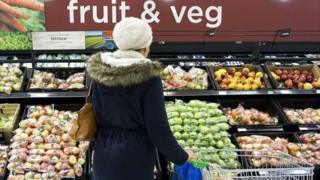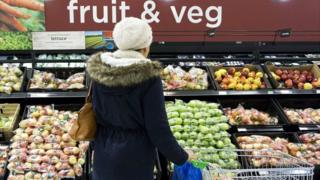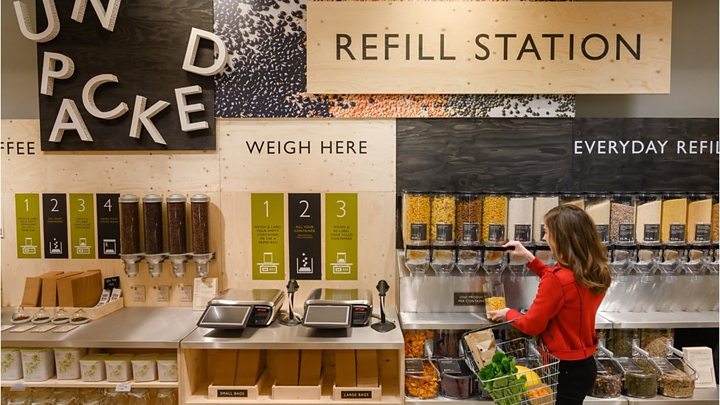Asda trials refills at ‘sustainability store’
Shoppers can fill their own containers at the store, as the supermarket tries to reduce plastic waste. …

 Image copyright Getty Images
Image copyright Getty Images Asda is launching a “sustainability store” where shoppers can fill their own containers with food.
Customers at a Leeds branch will be able to use refill stations for own brand rice and pasta, as well as Kellogg’s cereals and PG Tips.
Asda is the latest major grocer to launch an initiative to cut down on plastic packaging.
UK supermarkets are responsible for 58 billion pieces of plastic a year, according to Greenpeace.
Asda uses about 65,000 tonnes of plastic a year.
The “sustainability store” will open in May at the Asda Middleton site in Leeds.
“We will be testing and learning from the customers in Middleton to understand how we can reduce our environmental impacts,” said Asda chief executive Roger Burnley. “Our first priority will be to look at how we can reduce and remove plastic.”
Daniel Webb, founder of campaign group Everyday Plastic, said the launch was also “a big step” for companies such as Kellogg’s and Unilever whose products are included in the Asda trial.
‘Naked florist’
In-store trials will last for at least three months, with customers asked to give feedback.
The store will house a “naked florist” selling plastic-free bouquets, and will also sell loose produce such as cucumbers or mushrooms without any plastic packaging.
In addition, the branch will have a “reverse vending machine” for recycling plastic bottles.
Asda recently committed to reducing plastic by 15% by February next year, as well as making all of its own brand packaging fully recyclable by 2025.
Single-use plastic has become a major topic for discussion after the BBC’s Blue Planet II highlighted its effect on the oceans.
Major supermarkets have since pledged to cut down on their plastic waste.
The BBC has also announced plans for a year-long series of programmes and coverage on climate change, as part of the Our Planet Matters project.
What has been promised?
Waitrose has introduced refills for wine, beer, cleaning materials, and loose fruit and vegetables free from packaging across four stores after a trial at its Botley Road shop in Oxford.

Media playback is unsupported on your device
It has also said it will remove all black plastic from its own label ranges, and stop selling single-use coffee cups.
Other pledges made by major UK retailers include:
- Morrisons: Have 100% recyclable, reusable or compostable packaging by 2025 and offer paper carrier bags
- Tesco: Remove hard-to-recycle materials, including PVC, from its own brand products
- Sainsbury’s: Remove lightweight loose product bags from store and replace plastic film on fruit and vegetables with a recyclable option
- Aldi: Get rid of plastic wrapping on cabbages and cauliflower in some stores, and trial cardboard packaging on steak
Swiss-based global food giant Nestle also recently said it would invest up to £1.6bn in making packaging for its food products recyclable.
Consumer concerns
Richard Lim, chief executive of Retail Economics, said that Asda was another retailer reacting to “heightened consumer concerns about the environment”.
He said: “It’s a step in the right direction but we are at an embryonic stage in what is likely to be a very long journey. It will be a huge learning curve and one that tests the gap between what consumers say they ‘want’ and what they ‘do’ in reality.”
Previous research by the environmental charity Greenpeace suggested Asda might have further to go than other supermarkets.
It was ranked ninth out of the UK’s 10 biggest supermarkets for its plastic “footprint”.
Louise Edge, head of Greenpeace UK’s ocean plastics campaign, said that Asda’s action was “encouraging”.
But she argued that such schemes should be carried out more widely: “We’ll never recycle our way out of this crisis, so Asda and other UK supermarkets must urgently reduce plastic by switching to reusable and refillable packaging at scale.”



